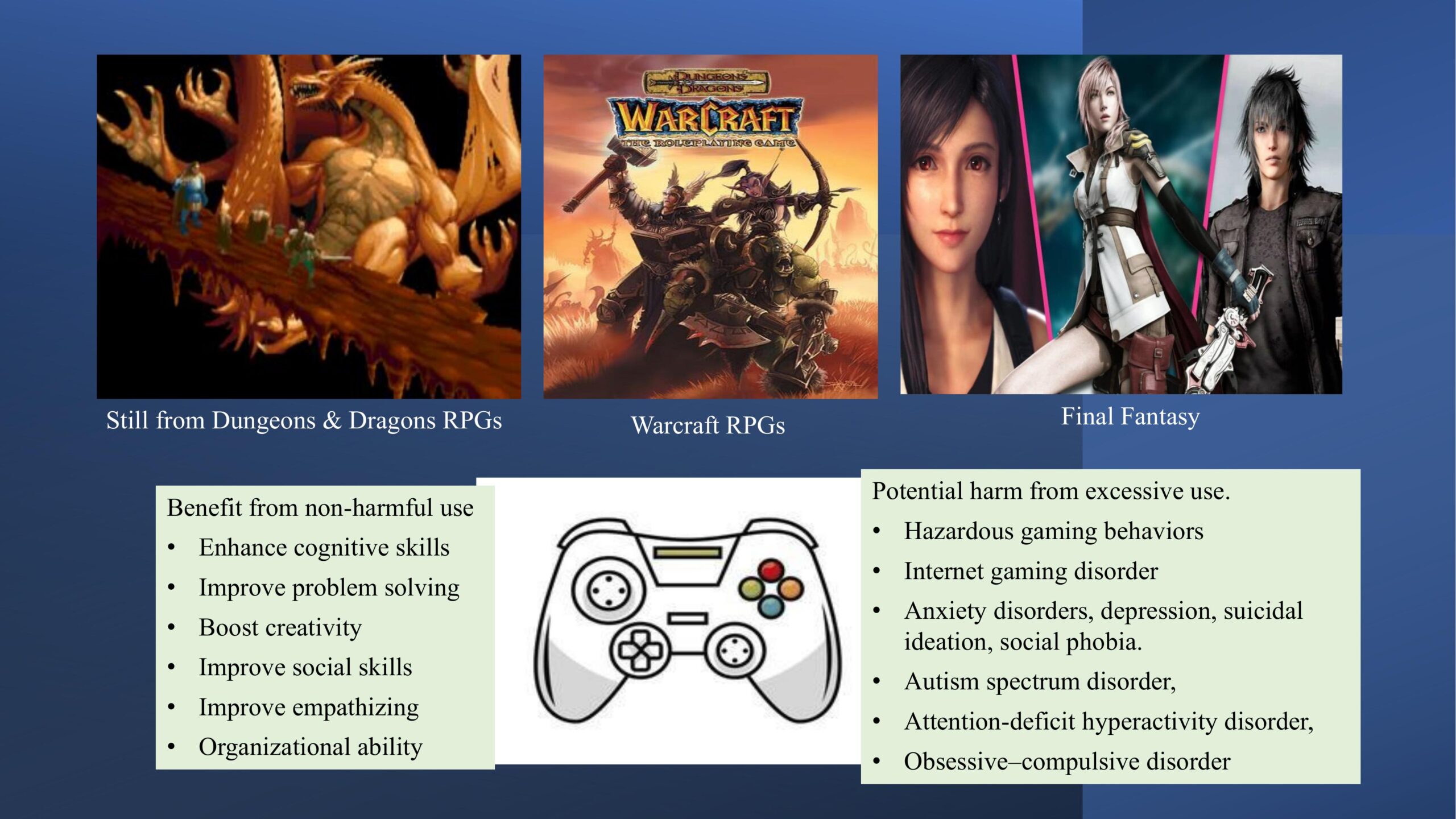Editorial
Volume 13 Issues 1 January, 2023

Editor, MINDS Newsletter, Department of Psychiatry, All India Institute of Medical Sciences, (AIIMS) Raipur, Chhattisgarh, Indian
Follow me Twitter
The video games were quickly embraced by the public right after their advent in 1972 by Magnavox Odyssey (1). The advent of the Internet in 1983 significantly further boost the advancement, from the previous version of hardware platform-based (PlayStation, Xbox, Nvida Shield) to current RPGs and MMORPGs. Soon, behavioural problems and dysfunction were noticed, and DSM 5 and ICD-11 classified them into Internet Gaming Disorder (IGD) and Gaming Disorder (GD) respectively.
All genres of internet games are equally addictive but the more advanced genre, such as Battle Royale Games (BRGs) and Role-Playing Games (RPGs), are more addictive (2).
In RPGs a players assume the role of a character in a fictional setting, usually narrated around traditional fantasy or sci-fi elements in contrast to other games. There a variety of RPGs are available such as early videogame consoles, single-player RPGs, Massive Action RPGs, Sandbox RPGs, Tactical RPGs, Roguelike RPGs, and Multiplayer Online RPGs (MMORPGs).
In the massively multiplayer online role-playing game (MMORPGs) player has the liberty to create a player avatar interacting with others in a much more realistic virtual setting. The Avatar can be a realistic or imaginative self-representation that exits both online or offline and acquire new skills and maturation. MMORPGs are the most socially engaged internet game till now associated with addictive potential more than first-person shooter (FPS) and real-time strategic (RTS) games (2) Examples of RPGs are WOW (World of Warcraft), 2007Scape, Final Fantasy XIV: Stormblood, Dungeons & Dragons and Vampire: The Masquerade
The psychological aspect of BRGs & RPGs:
The advanced gaming technologies enabling role-play as ‘avatar’, interactions and socialization in a virtual world can potentially temper and alter our perception of self and the real world. The psychology of motivation works complexly for an individual; the game provides or compensates for one’s inner needs. For instance, a person with hostile tendencies, poor social skills or social anxiety may have a strong urge to escape from real social situations and may find the virtual world more accommodating (3). Gaming motivation is a strong predictor for problematic gaming than the actual duration of gaming (4).
The two primary motivations, obsessive and harmonious, play a crucial role in problematic gaming: both lead to feelings of achievement and socialization (4). Achievement and socialisation are strong motivational forces, along with Immersion, relaxation, and escape (5). Problematic gaming has stronger associations with Obsessive than harmonious motivation (5). Harmonious motivation or passion correlates with positive emotion while gaming, leading to an association with exploration (6). The motivations of simply wanting to be “immersed” in the game or to relax do not appear to be reliable predictors of addiction (5). To avoid routine everyday hassles and distress, the ‘negative escapism’ corresponds to playing being negative reinforcement and is also shown as a motivational factor for MMORPGs—socialisation and exploration rank high among MMOR players’ interests. Achievement is a lesser motivator, followed by identifying with an avatar and escaping from reality (3).
Neurobiology of RPGs:
Psychometric studies suggest that observed self-concept deficits in an addicted massively multiplayer online role-playing game (MMORPG) are compensated through the replacement of their ideal self by their avatar (i.e., graphical agent in the virtual world). Neurobiological studies indicate that increased identification with their avatar in regular MMORPG gamers is possibly reflected by enhanced avatar-referential brain activation in the left angular gyrus (AG). The studies based on functional magnetic resonance images (fMRI) showed significantly higher brain activation of the left angular gyrus (AG) compared to non-addict MMORPGs players (7).
MMORPGs addicts showed a greatly extended negative body image and lower gender identity levels, as well as decreased bilateral brain activations in the AG and the middle occipital gyrus during self-perception. During avatar perception, they exhibited higher activations in the left AG (8).
There are left AG hyperactivations in Internet gamers during avatar reflection and a correlation with symptom severity. Striatal hypoactivation during self-reflection (vs ideal reflection) was observed in social network users and was correlated with symptom severity. Hence, RPGs liked to increase identification with one’s Avatar, evidenced by high left AG activation and emotional regulation deficit reflected by reduced activation during self-reflection in pathological gamers (9).
Psychological benefits from BRGs & RPGs:
IGD has many detrimental effects, yet playing moderately while keeping other goals in mind might have positive influences. Moderate gaming in a non-harmful pattern has also been shown to have several cognitive, emotional, and social benefits (10).
Role-playing games potentially foster various cognitive skills; players exhibit quicker and more precise attentional allocation and more visual spatial resolution (11). RPGs improve problem-solving, boost creativity, and improve self-efficacy and perceived competence (11).
Video games provide a perfect learning environment for developing an incremental theory of intelligence because they give players quick, concrete feedback on the efforts they have made. This motivating behaviour may be applied professionally and academically(11). Research has demonstrated a link between playing favourite video games and mood improvement or increased happy sentiment (12). As players learn the advantages of handling frustration and anxiety in adaptive ways, playing games may encourage the capacity to reappraise emotional events flexibly and effectively. By playing different roles and experiencing different perspectives, players can learn to understand and empathize with others (13). RPGs need quick judgements on who to trust, who to avoid, and how to manage a group best. Given these immersive social circumstances, gamers quickly pick up social skills and prosocial behaviour that may transfer to their interactions with peers and family outside the gaming environment. The capacity to lead organisations and like-minded individuals in social issues is another way that social skills are demonstrated in civic involvement (14).
RPGs were also used as therapeutic tools in psychodrama and drama therapy; psychodrama therapy involves patients under supervision dramatizing several scenes, such as specific happenings from the past, often with help from a group, enabling them to reflect on and explore alternative ways of dealing with them (15).
The causative relationship of RPGs with childhood-onset psychiatric disorders is not fully understood. Extensive research on associated risk factors and protective factors for IGD revealed that male gender, underline depression, stress, anxiety, hostility, aggression, impulsivity, escape motivation, and low self-esteem were strong risk factors for IGD. At the same time, age, intelligence, education, and life satisfaction were protective factors for IGDs (16). The excessive playing of RPGs can lead to internet addiction, the risk of depression, anxiety, insomnia, and social withdrawal. Hence, RPGs do not directly lead to psychiatric conditions per se but underline personality factors; individual susceptibility plays a crucial role in eventually developing an overt psychiatric condition.
Hence we can conclude that RPGs are found to have potential psychological and therapeutic benefits in clinical settings. We need to identify high-risk candidates for having potential mental health hazards and addictive behaviour for the earliest interventions.
Reference:

